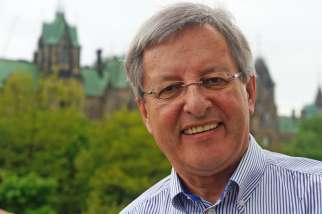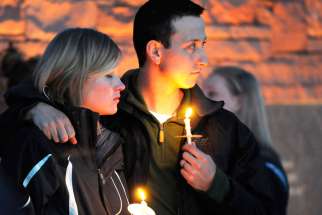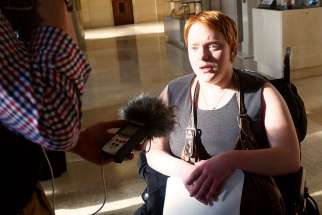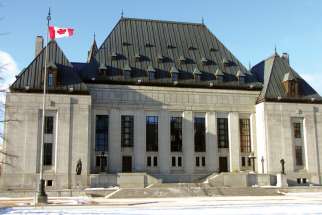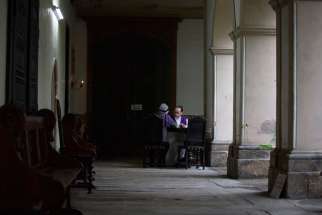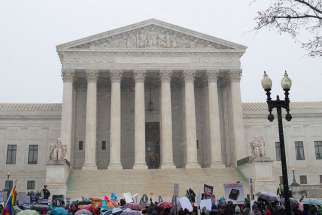OTTAWA - The Supreme Court of Canada ruled April 15 that Saguenay council must stop praying before meetings and pay damages to an atheist who launched a complaint in the matter.
Faith is common life
The day the Supreme Court released its decision in the case involving Montreal’s Loyola High School, I thought it was merely more judicial zaniness on offer.
Loyola’s victory
Much is being made — and deservedly so — of Loyola High School’s victory on behalf of religious freedom. The Jesuit-run Montreal school deserves praise for sticking it out through a seven-year court slog that has made Canada a better place for people of all religions.
OTTAWA - Montreal's Loyola High School has won the right to teach its students the Catholic faith from a Catholic perspective.
Somerville urges politicians to show “backbone” after Supreme Court euthanasia decision
OTTAWA - Margaret Somerville has called on Parliamentarians to "have a backbone" in dealing with euthanasia in Canada.
It’s the end of life as we know it
Opponents rally in wake of Supreme Court decision on assisted suicide
OTTAWA - Disappointment, indignation and calls to invoke the notwithstanding clause followed a historic Supreme Court of Canada unanimous decision that struck down a ban on physician-assisted suicide and opened the door to assisted death for people who may not have a terminal illness.
Front line euthanasia ethics
At this month’s Supreme Court hearing on assisted suicide, much time was spent arguing whether Canadians have a right to be killed. Few moments were spent considering those who would have to do the killing.
BATON ROUGE, La. - Louisiana's Supreme Court has ruled that a priest may be compelled to testify as to what he heard in the confessional in 2008 concerning an abuse case.
The Supreme Court Monday (May 5) declared that the Constitution not only allows for prayer at government meetings, but sectarian prayer.
Killing is not care
The Criminal Code, Parliament and the Supreme Court have been consistent and clear on the matter of euthanasia and assisted suicide. Both offences are serious crimes as prescribed in law and as upheld in various votes by the nation’s top legislative and judicial bodies. Yet the Province of Quebec is bulling ahead with a chilling attempt to circumvent the law by decriminalizing euthanasia through a legislative sleight-of-hand.
In mid-January, the PQ government of Pauline Marois trumpeted a report suggesting doctors should sometimes be allowed to kill patients. Naturally, that is not how the report is worded. It speaks of “medically aided death” and suggests that euthanasia is just another “part of the continuum of care” provided by doctors. So on some days doctors will deliver a baby, or remove tonsils, or treat cancer, and on other days they will deliver care by killing the patient.
This is an offensive notion, of course, and it must be opposed forcefully by society in general and by the federal government in particular.
By June, Quebec is expected to propose legislation to declare euthanasia is a medical procedure and therefore strictly a provincial matter beyond the reach of the Criminal Code or Parliament interference. Assumedly, the Quebec government has lawyers who feel confident in making that argument even though it strikes most reasonable people as far-fetched to claim killing someone can be equated with providing them with medical care.
This legislative end-around follows a resounding rejection two years ago of a private member’s euthanasia bill introduced by Bloc Quebecois MP Francine Lalonde. She lost that vote 250-57. The Supreme Court had rejected euthanasia in a 1993 decision. Two years after that, a senate committee concluded euthanasia should remain a criminal offence. Although euthanasia is legal in some countries, Canada, to its credit, has consistently rejected it.
Even Quebecers are unconvinced. The “Dying With Dignity” committee crossed the province for two years hearing submissions. Sixty per cent of people or groups opposed euthanasia. Many doctors are appalled that their oath to “do no harm” could be perverted to countenance killing.
“This act is abhorrent to us as doctors and should appall Quebecers who care about social justice and building communities that care about the most vulnerable,” said Dr. Catherine Ferrier, spokesperson for a group called The Physicians’ Alliance for Total Refusal of Euthanasia.
Instead of writing laws to kill sick and suffering people, politicians in Quebec and across Canada should be increasing the number and improving the quality of palliative care centres. Euthanasia is a deplorable solution for old age, illness and infirmity. The focus should be on providing comfort and care, and building a society that treats all life with dignity and respect.
Supreme Court to hear prostitution appeal
OTTAWA - The Supreme Court of Canada has agreed to hear an appeal of an Ontario Court of Appeal ruling that upheld most of a lower court’s decision to strike down some of Canada’s prostitution laws.
The federal government had applied for leave to appeal to the Supreme Court in late May.
Prostitution is not illegal in Canada, but activities surrounding it are: soliciting for the purposes of prostitution, running a brothel or bawdy house and living off the avails of prostitution or pimping.
But in a landmark ruling March 26, the Ontario Court of Appeal rendered a decision that legalizes brothels and allows prostitutes to hire protection and other staff. Public solicitation and pimping remain illegal but the court ruled that prostitutes have a constitutional right to work in safe environments such as an organized brothel.
However, the Ontario court suspended implementation of its decision for one year to give Parliament time to amend the criminal code.
The Catholic Civil Rights League welcomed news of the appeal.
“With our partners REAL Women of Canada and Christian Legal Fellowship, we have been intervenors in this case from its beginning in Ontario Superior Court,” said league executive director Joanne McGarry.
“Our position was and remains that while the law is not perfect, any liberalization of it would not improve prostitutes’ safety, and would make it easier to lure and exploit vulnerable girls and women
“Evidence from other jurisdictions suggests that when legalization occurs, the illegal side of the business continues to flourish,” she said in a statement.
REAL Women of Canada national vice president Gwendolyn Landolt says she and the other two groups expect to file their intention to intervene by next April.
Landolt said REAL Women would like to see prostitution itself prohibited.
“We do want to see that women who are prostitutes have an option to get off the streets, into safe houses and to receive treatment,” said Landolt, who noted many have problems with alcohol or drugs and sell sex to maintain their addictions.
“They need help. You don’t encourage them by widening the law.”
She said cases where prostitution laws have been loosened have not brought more safe conditions for prostitutes.
“Brothels do not protect women,” she said. “In the Netherlands, one-third of brothels had to be shut down because the criminal element became involved.
“Prostitution is inherently dangerous, no matter what circumstances are involved.”
Landolt warned about the consequences to women and children who are being trafficked into, out of or across Canada into the sex trade. Canada is already a transit country for traffickers bringing sex slaves into the United States, she said. Aboriginal women and children are especially vulnerable to trafficking.
“Human trafficking is one of the most lucrative criminal undertakings in the world,” she said, along with the sale of illegal weapons and the drug trade.


